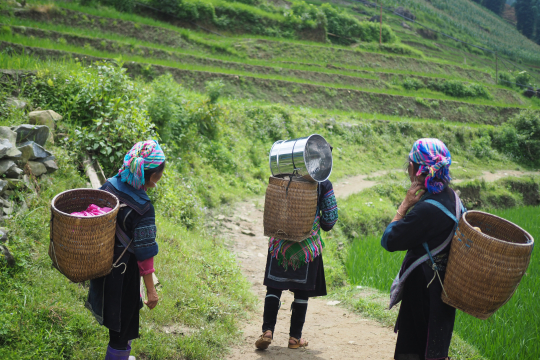Last month, the co-leaders of SETI, Marcela Jaime and Marc Jeuland, alongside investigators Arjan de Haan, Mairi Dupar, Jonathan Phillips, Bhim Adhikari and Flaubert Mbiekop; released a policy brief for the G20 titled “Making Clean Energy Transitions More Inclusive: Evidence, Knowledge Gaps, and Policy Options in Low-Income Economies”.
In many countries in the Global South, women are responsible for providing energy such as wood collection to their homes and daily activities. Energy access and women’s empowerment often form a virtuous cycle. However, while empowerment increases the adoption of cleaner energy, women are pigeonholed as consumers, and not empowered as producers, let alone climate leaders.
The policy brief summarizes the supporting evidence and knowledge gaps for the transition to an inclusive clean energy. The main challenges exposed were related to gender inequality, financing, implementation barriers, and gaps in research and learning, among others.
The energy transition must be inclusive
According to the policy brief, multilateral institutions have highlighted the need for economic stimulus spending to be both green and socially inclusive, meaning the recognition of links between gender and low-carbon ambitions. Women are important stakeholders in the transition since they are strongly related to energy activities and concerns. Women are more likely to support clean energy transitions as they are one of the most vulnerable groups to receive the burdens of dirty energy sources.
Switching to clean cooking technologies can improve their lives and improve health, it can lower the drudgery of domestic work and shift women’s time towards education, enhance access to information, and help challenge the social norms that give women the main responsibility for the household.
The challenge to finance the transition
There are financial gaps and implementation barriers that prevent an inclusive energy transition: The amount of clean energy investment flowing into developing countries fell between 2010 and 2021, from US$11.9 billion to US$10.8 billion. Agreements like the mobilization of US$100 billion annually to support developing countries in mitigating and adapting to climate change have not been fulfilled.
The private sector is also poorly represented in many of these markets. Moreover, climate investments are highly concentrated in certain regions, leaving the poorest and most fragile countries and areas receiving the least investment. For example, this is the case of The Middle East and Africa receiving only 2% of global investment and Latin America and the Caribbean receiving 4%.
Solutions presented to the G20
The Group of Twenty (G20) is the premier forum for international economic cooperation which plays an important role in all major economic issues such as supporting the thread that links a sustainable energy transition to development and climate goals. Energy poverty and marginalization are well known to prevent the adoption of clean energy, thereby creating a vicious circle. The authors explain that it is necessary for investment programs by G20 members and in low-income economies to recognize inequalities, including women's lack of access to skills training and other enablers of employment in the energy sector.
Some of the solutions mentioned in this policy brief address gender issues: It is necessary to see women not merely as energy consumers but also in roles along the energy value chain as producers, managers, traders, and marketers; climate investment instruments and institutions need to be aligned with the realities of the financial needs; and further research and learning for policy making is needed. For instance, the G20 can provide a space for policy-oriented learning through the establishment and support of a permanent platform that may coordinate opportunities available for investments, which would promote inclusive and just energy transitions.
About the authors: Arjan de Haan, Mairi Dupar, Marc Jeuland, Jonathan Phillips, Monica Marcela Jaime Torres, Bhim Adhikari & Flaubert Mbiekop. Click on the title of the brief to access to the full document: Making Clean Energy Transitions More Inclusive: Evidence, Knowledge Gaps, and Policy Options in Low-Income Economies
